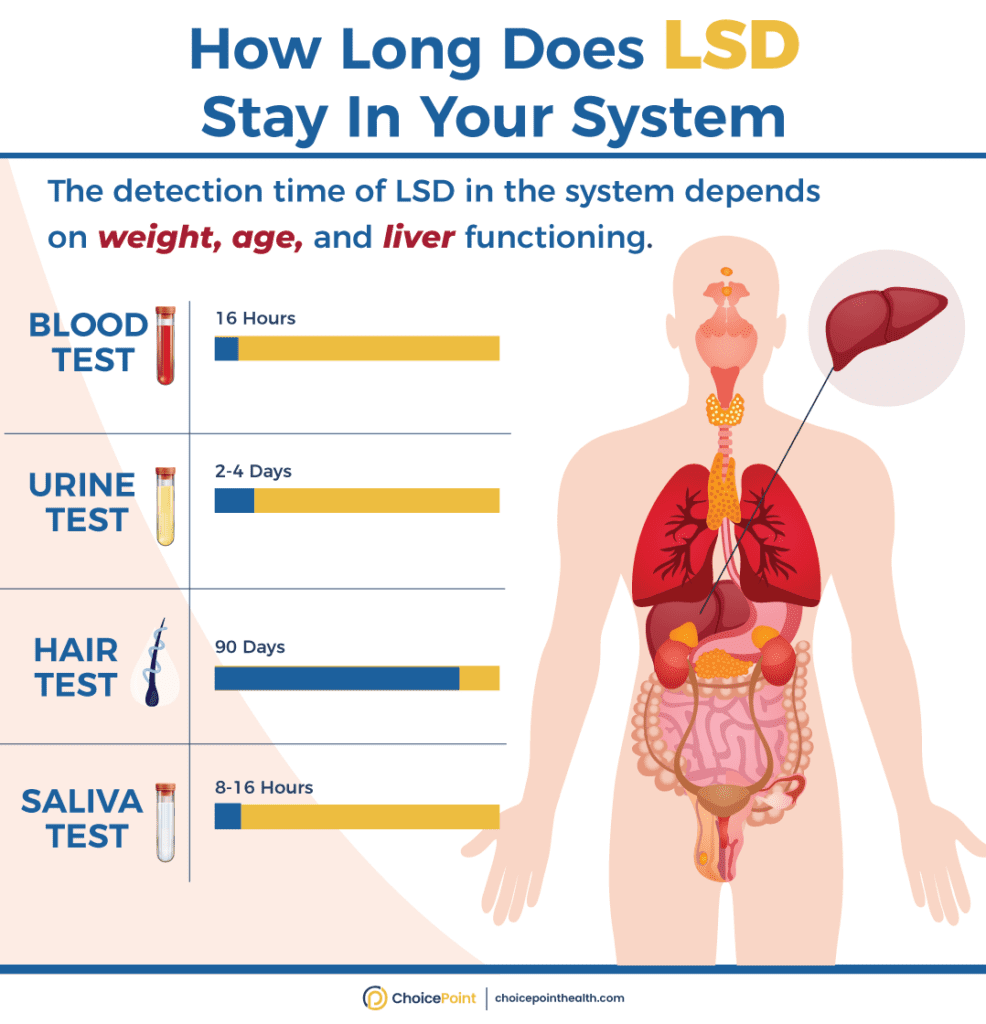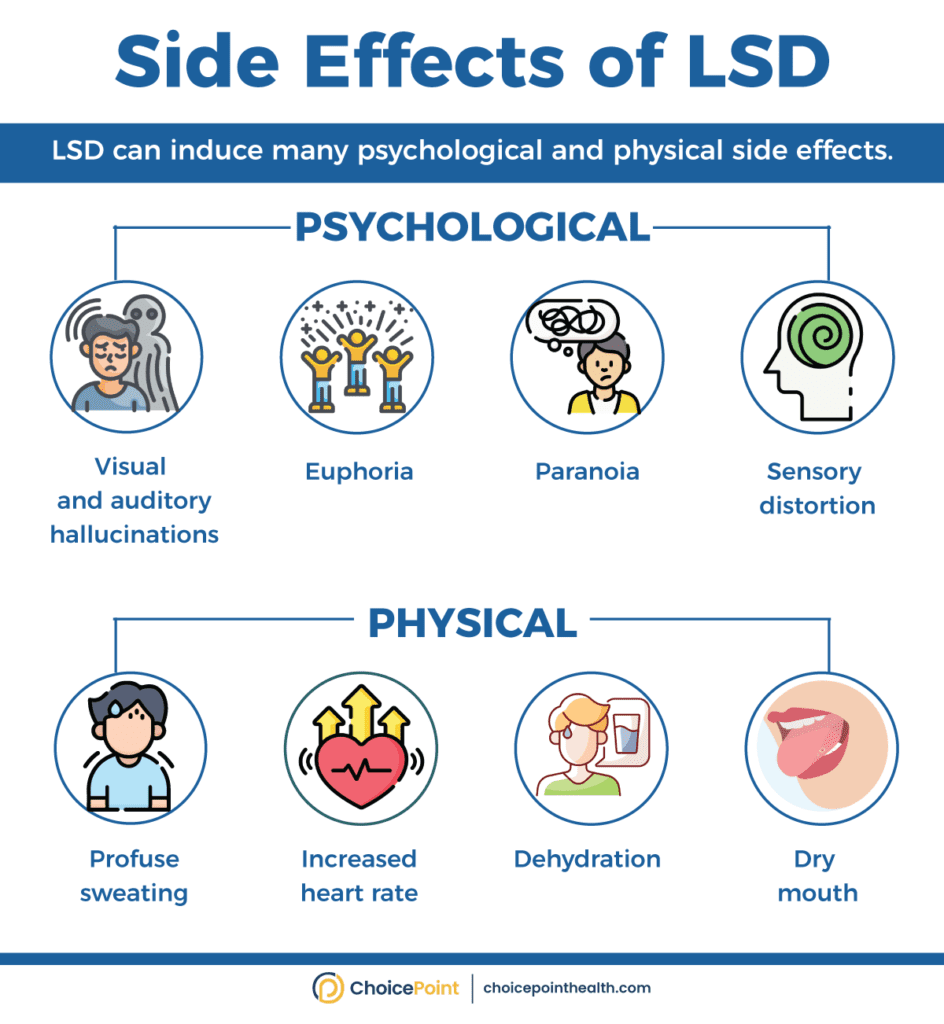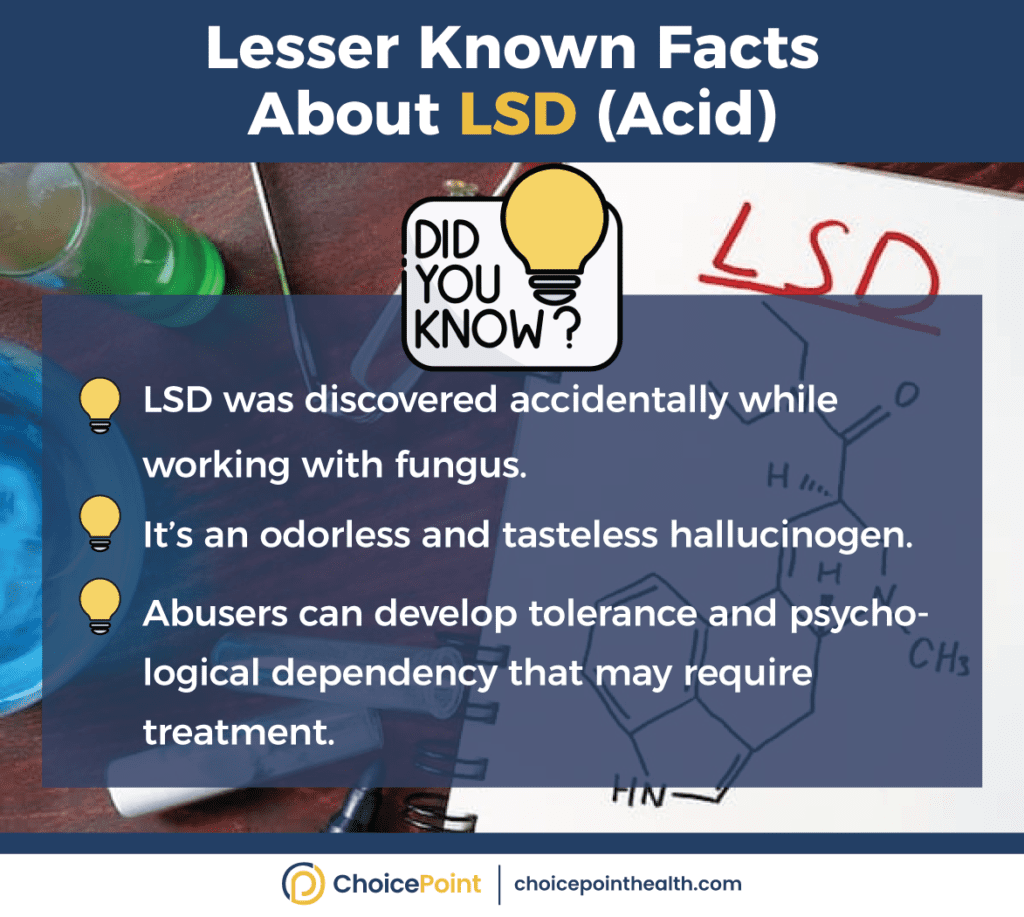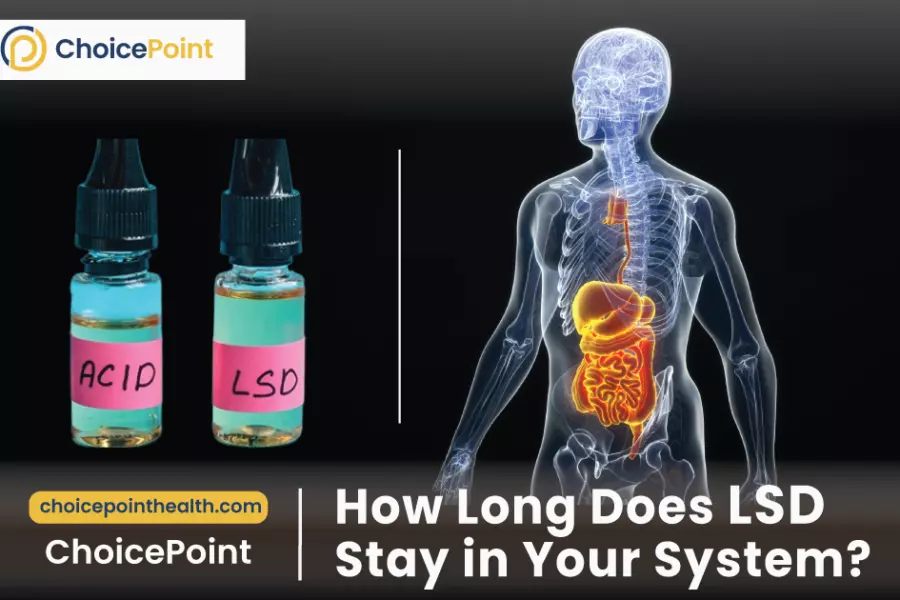Lysergic acid diethylamide or LSD, also sometimes known as acid, is a synthetic chemical considered an illegal hallucinogenic drug. It has a long-lasting effect on the user’s perceptions and can be detected on drug tests. Hence, LSD is classified as a Schedule I drug, indicating that this acid is not currently accepted for medical use. Read ahead to learn about LSD abuse and addiction and how long does LSD stay in your system?
Table of Contents
What Is LSD And Why Is LSD Abused?
Lysergic acid diethylamide or LSD is purely a recreational drug with no pharmaceutical applications. However, it is a part of the pharmacological group called psychedelics and is one of the most potent chemicals famous for altering the psychological state of its users. This odorless and colorless drug comes in the form of drops or tablets.
People commonly use LSD to feel the ‘out-of-the-body’ experience because when LSD is introduced into the system, it causes hallucinations and sensations that are not real. As LSD influences the receptors that are mainly involved in regulating serotonin (a neurotransmitter that controls mood and sensory perceptions), it gives users a false sense of being out-of-the-body. Therefore, LSD is not considered addictive per se, but the effects caused by LSD make the user abuse it repeatedly.
How Long Does LSD Stay in Your System
LSD or acid can be tougher to detect than other drugs because it is quickly broken down in the liver. The half-life of LSD is only 3 to 4 hours and is readily absorbed through the gastrointestinal tract and mucosal membranes after being taken orally. After being consumed, LSD reaches the bloodstream and organs, taking roughly 10 to 15 minutes as LSD or acid is mostly digested by the liver. The liver then converts it to a variety of inactive metabolites. Almost all of the medication is metabolized and eliminated within 24 hours. Let’s take a look at how long LSD stays in your system.

How Long Does LSD Take to Kick in?
Time LSD Takes to Kick in
After taking LSD, the effects usually kick in within 20 to 90 minutes. The effects of LSD abuse can last anywhere from 6 to 15 hours. The effects of LSD abuse are commonly referred to as “tripping.” The duration of tripping can vary on the following factors:
- Age
- Dosage
- Weight
- Tolerance of the drug
- Genetic makeup
- Liver health
How Long Does LSD Stay in the Urine?
LSD can be detected up to 2 to 4 days after the first dosage.
How Long Does LSD Stay in Your Saliva?
Swab tests that use saliva can detect LSD up to 8 to 16 hours after the first dose.
How Long Does LSD Stay in the Hair?
Traces of LSD can be found for up to 90 days after use.
How Long Does LSD Stay in the Blood?
LSD stays in the blood for about 16 hours after the first dose.
At-home Drug Testing and Telehealth Services
In the current economic state, where gas prices are increasing every day, we understand that it becomes difficult to travel to on-site clinics for a simple drug test. This is why ChoicePoint lets people struggling with substance abuse perform an at-home drug test, which means drug testing can be done virtually. Therefore, taking an LSD drug test is easier than you think; all you have to do is:
- Schedule an appointment and connect with your virtual doctor using n video-enabled device right from your home.
- Using the at-home drug test kit that will be mailed to you, perform an LSD drug test under your doctor’s supervision.
- Send the sample to the laboratory for further evaluation
- Discuss how to proceed with LSD addiction treatment with your doctor.
Is LSD Addictive?
A study showed that 9.7 % of the population in the U.S. above the age of 12 used LSD at some point at least once in their lifetime. Well, LSD is technically not regarded as an addictive drug. However, LSD may cause tolerance and euphoria. As a result, this may lead some users to take it frequently in large dosages to attain the same results. Given the uncertainty of the medicine and amount, this is extremely risky and can result in severe addiction.
Symptoms of LSD Overdose
As discussed earlier, LSD may not be an addictive drug, but its usage can cause psychological dependence. Therefore, abusing LSD has certain effects on its abuser. Consequently, it is very easy to overdose while using LSD as frequent users may want the continued pleasure that LSD provides. If a person overdoses while using LSD or acid, the abuser may experience:
- rapid heartbeat
- high blood pressure.
- dilated pupils
- sudden sweating or feeling chills
- insomnia
- dryness of mouth
- long-term psychosis that may lead to intense depression
- elevated body temperature
LSD overdose is known as a bad trip. The user is completely detached from reality, and anything can happen if urgent care is not provided. Looking for safe and effective rehabilitation in New Jersey? Contact ChoicePoint and start addiction treatment today!
LSD Withdrawal Symptoms
LSD withdrawal is different because, unlike drugs, LSD does not cause physical dependence. It may cause tolerance which leads to psychological dependence making its withdrawal very unpredictable. However, LSD can cause chemical dependence, which is more dangerous and may cause very painful withdrawal symptoms. Psychological dependence LSD withdrawal symptoms include:
- general discomfort
- Lack of concentration
- Flashbacks
- Depression
- Paranoia
- restlessness and insomnia
- Hypersomnia

What Are the Risks of LSD?
ChoicePoint: An Addiction Rehab That Can Help With LSD Abuse
There is a common misconception that LSD is not addictive and doesn’t require proper treatment. On the contrary, LSD or acid has such a significant influence on cognitive function that it can either cause or trigger serious mental disorders. At ChoicePoint, the addiction treatment for LSD focuses on understanding and treating not just the use of the drug itself but also the underlying issues that led to its use and abuse. Here are addiction treatment programs that can help treat LSD addiction.
Medical Detox
Even though LSD mostly has psychological side effects, dealing with the physical withdrawal symptoms of LSD can be hard. The best option is turning to a medical detox program where a team of experienced professionals can help you successfully detox from LSD. In addition to that, they will provide supervision, and that too in a safe and comfortable setting.
Outpatient Rehab
With Outpatient rehab, an individual does not need to be present on-site 24/7 to receive addiction treatment. They can visit the doctor on scheduled days and carry on with their daily routine.
To treat the side effects of LSD addiction, our doctors at ChoicePoint can provide:
- Medical Counseling using the FDA-approved MAT program
- Targeted Therapies that include (CBT and DBT)
All aspects of the Outpatient treatment program can also be completed virtually through ChoicePoint’s telehealth services. Call us at 844.445.2563 to learn more.

LSD Unknown Facts
Dual Diagnosis Addiction Treatment Program
The connection between addiction and developing mental health disorders is profound. As LSD is purely a recreational drug used to alter mental perceptions, its effects on the mind can form some type of mental illness. Therefore, it is important to treat LSD addiction using a dual diagnosis treatment program. At ChoicePoint, during the dual-diagnosis treatment, our specialized doctors may:
- Treat substance abuse and mental illness simultaneously for sustainable recovery
- Provide targeted therapy sessions and effective Counseling
- Prevent the chances of a relapse
Do you feel like you have started abusing LSD and can’t manage on your own? Seek help today as it can badly deteriorate your mental health. All you have to do is simply contact 844.445.2563 and make an appointment with ChoicePoint DEA-certified doctors who will take care of you as we are specialized in co-occurring disorders treatment in New Jersey.
Aftercare
LSD addiction treatment requires ongoing support even after an individual leave the Outpatient program. Aftercare programs are just as important as addiction treatment programs that make sure an individual who went through addiction treatment stays on the path to recovery. Choosing ChoicePoint means:
- Ongoing Counseling from addiction specialists
- Encouragement to stay sober
- Constant support to learn to cope with cravings
Get Help – How Long Does Lsd Stay in Your System?
Not all LSD abusers report having pleasant experiences. As it alters one’s perceptions of time, feeling, and awareness. Also, with frequent LSD abuse, one can develop a tolerance for LSD which can be detrimental to physical and mental health. Therefore, as long as LSD stays in your system, an individual is prone to relapse. This concludes if you or someone you love is apprehensive about their LSD intake, then they must take at home drug test and seek help from addiction professionals to assist them in quitting their LSD use. The best treatment for LSD abuse is medically assisted therapy sessions that can help them to understand their addictions and learn ways to cope with them.
Medical Disclaimer:
ChoicePoint aims to improve the quality of life for people struggling with substance use disorder and mental health issues. Our team of licensed medical professionals research, edit and review the content before publishing. However, this information is not intended to be a substitute for professional medical advice, diagnosis, or treatment. For medical advice please consult your physicians or ChoicePoint's qualified staff.










Review How Long Does LSD Stay In Your System?.